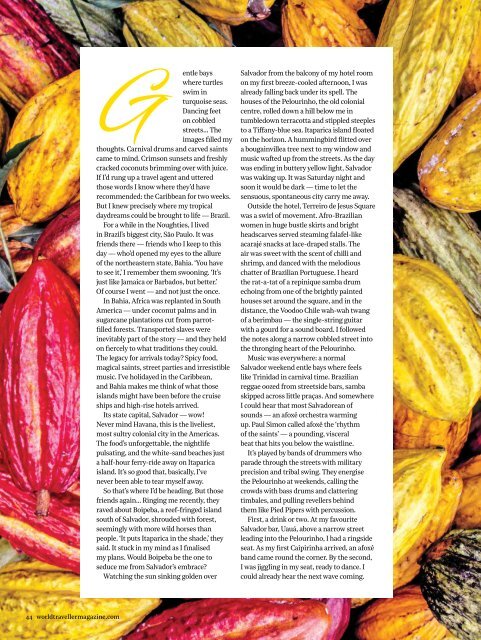You also want an ePaper? Increase the reach of your titles
YUMPU automatically turns print PDFs into web optimized ePapers that Google loves.
entle bays<br />
where turtles<br />
swim in<br />
turquoise seas.<br />
Dancing feet<br />
on cobbled<br />
streets... The<br />
images filled my<br />
thoughts. Carnival drums and carved saints<br />
came to mind. Crimson sunsets and freshly<br />
cracked coconuts brimming over with juice.<br />
If I’d rung up a travel agent and uttered<br />
those words I know where they’d have<br />
recommended: the Caribbean for two weeks.<br />
But I knew precisely where my tropical<br />
daydreams could be brought to life — Brazil.<br />
For a while in the Noughties, I lived<br />
in Brazil’s biggest city, São Paulo. It was<br />
friends there — friends who I keep to this<br />
day — who’d opened my eyes to the allure<br />
of the northeastern state, Bahia. ‘You have<br />
to see it,’ I remember them swooning. ‘It’s<br />
just like Jamaica or Barbados, but better.’<br />
Of course I went — and not just the once.<br />
In Bahia, Africa was replanted in South<br />
America — under coconut palms and in<br />
sugarcane plantations cut from parrotfilled<br />
forests. Transported slaves were<br />
inevitably part of the story — and they held<br />
on fiercely to what traditions they could.<br />
The legacy for arrivals today? Spicy food,<br />
magical saints, street parties and irresistible<br />
music. I’ve holidayed in the Caribbean,<br />
and Bahia makes me think of what those<br />
islands might have been before the cruise<br />
ships and high-rise hotels arrived.<br />
Its state capital, Salvador — wow!<br />
Never mind Havana, this is the liveliest,<br />
most sultry colonial city in the Americas.<br />
The food’s unforgettable, the nightlife<br />
pulsating, and the white-sand beaches just<br />
a half-hour ferry-ride away on Itaparica<br />
island. It’s so good that, basically, I’ve<br />
never been able to tear myself away.<br />
So that’s where I’d be heading. But those<br />
friends again... Ringing me recently, they<br />
raved about Boipeba, a reef-fringed island<br />
south of Salvador, shrouded with forest,<br />
seemingly with more wild horses than<br />
people. ‘It puts Itaparica in the shade,’ they<br />
said. It stuck in my mind as I finalised<br />
my plans. Would Boipeba be the one to<br />
seduce me from Salvador’s embrace?<br />
Watching the sun sinking golden over<br />
Salvador from the balcony of my hotel room<br />
on my first breeze-cooled afternoon, I was<br />
already falling back under its spell. The<br />
houses of the Pelourinho, the old colonial<br />
centre, rolled down a hill below me in<br />
tumbledown terracotta and stippled steeples<br />
to a Tiffany-blue sea. Itaparica island floated<br />
on the horizon. A hummingbird flitted over<br />
a bougainvillea tree next to my window and<br />
music wafted up from the streets. As the day<br />
was ending in buttery yellow light, Salvador<br />
was waking up. It was Saturday night and<br />
soon it would be dark — time to let the<br />
sensuous, spontaneous city carry me away.<br />
Outside the hotel, Terreiro de Jesus Square<br />
was a swirl of movement. Afro-Brazilian<br />
women in huge bustle skirts and bright<br />
headscarves served steaming falafel-like<br />
acarajé snacks at lace-draped stalls. The<br />
air was sweet with the scent of chilli and<br />
shrimp, and danced with the melodious<br />
chatter of Brazilian Portuguese. I heard<br />
the rat-a-tat of a repinique samba drum<br />
echoing from one of the brightly painted<br />
houses set around the square, and in the<br />
distance, the Voodoo Chile wah-wah twang<br />
of a berimbau — the single-string guitar<br />
with a gourd for a sound board. I followed<br />
the notes along a narrow cobbled street into<br />
the thronging heart of the Pelourinho.<br />
Music was everywhere: a normal<br />
Salvador weekend entle bays where feels<br />
like Trinidad in carnival time. Brazilian<br />
reggae oozed from streetside bars, samba<br />
skipped across little praças. And somewhere<br />
I could hear that most Salvadorean of<br />
sounds — an afoxê orchestra warming<br />
up. Paul Simon called afoxê the ‘rhythm<br />
of the saints’ — a pounding, visceral<br />
beat that hits you below the waistline.<br />
It’s played by bands of drummers who<br />
parade through the streets with military<br />
precision and tribal swing. They energise<br />
the Pelourinho at weekends, calling the<br />
crowds with bass drums and clattering<br />
timbales, and pulling revellers behind<br />
them like Pied Pipers with percussion.<br />
First, a drink or two. At my favourite<br />
Salvador bar, Uauá, above a narrow street<br />
leading into the Pelourinho, I had a ringside<br />
seat. As my first Caipirinha arrived, an afoxê<br />
band came round the corner. By the second,<br />
I was jiggling in my seat, ready to dance. I<br />
could already hear the next wave coming.<br />
44 worldtravellermagazine.com

















